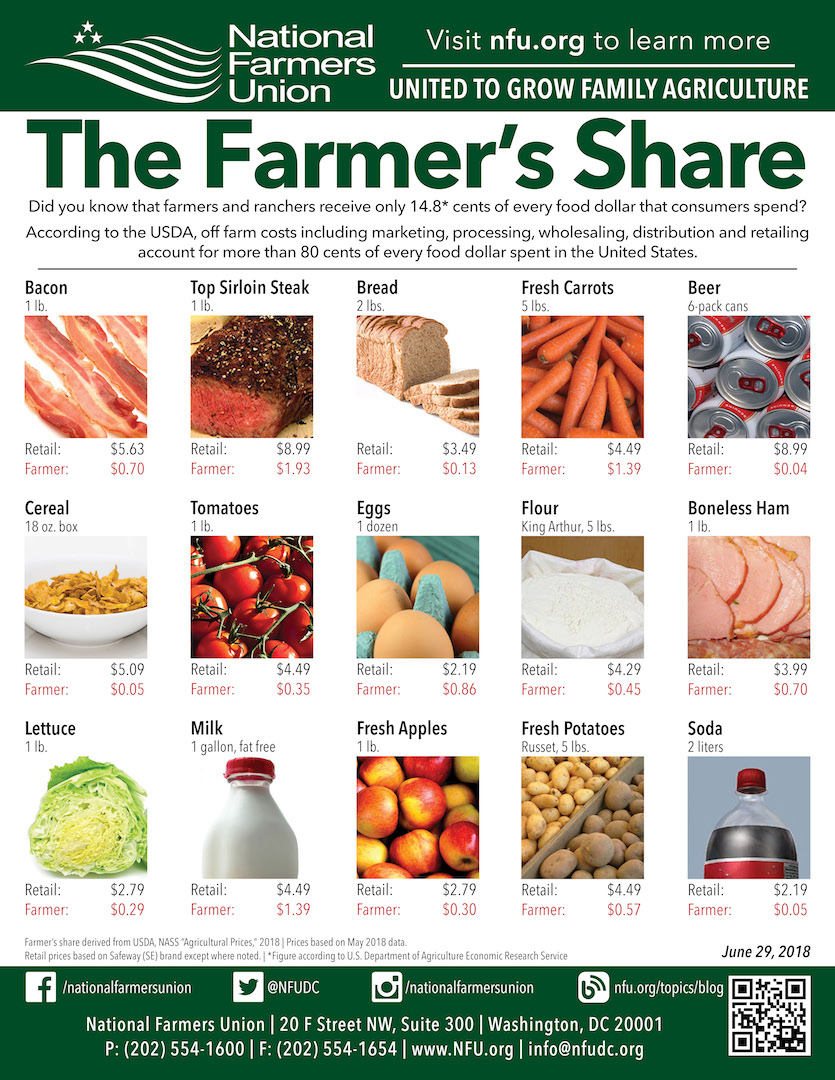Reconcile Billions of Gallons of Lost Demand for Biofuels
from National Farmers Union
WASHINGTON – Ahead of an expected Trump Administration announcement on changes to the nation’s biofuel policies, National Farmers Union (NFU) is urging the President to follow through on his promises to support American family farmers and the biofuel industry by allowing year-round use of E15 gasoline, ceasing undue hardship waivers to oil refiners, and making up for lost demand as a result of previous waivers.
Building on a recent letter from farm and biofuel groups to President Trump, NFU President Roger Johnson said that while an E15 waiver is a step in the right direction towards expanded use of American grown biofuels, such a measure on its own would not make up for the billions of gallons of lost demand for ethanol that have resulted from Renewable Fuel Standard (RFS) exemptions handed out by former EPA chief Scott Pruitt.
“The historic decline in the farm economy over the past five years has been exacerbated by mishandling of the nation’s chief biofuel policy, the Renewable Fuel Standard,” said Johnson. “While a move to allow year-round use of E15 gasoline is expected to increase domestic demand for ethanol by 1.3 billion gallons over the next five years, that number pales in comparison to the projected 4.6 billion gallons worth of demand that would be lost over the next 6 years if EPA continues handing out hardship waivers to oil refiners.”
The administration has been working on changes to biofuel policies that would ease tensions between biofuel and oil industries. Yet, to date, its actions have undercut demand for biofuels by waiving oil refiner requirements to comply with the RFS. USDA Secretary Sonny Perdue last month said the administration will soon allow year-round use of E15 gasoline – a bump for the biofuel sector.
Johnson said such an announcement must be accompanied by a provision that makes up for the billions of gallons of lost demand as a result of hardship waivers, as well as a commitment not to further erode demand through continued use of waivers. “An announcement on E15 in and of itself does not make whole a biofuels industry that has experienced significant damage as a result of the former EPA administrator’s actions,” he said.
Johnson said such a request is commonsense for an administration that has pledged to support family farmers and American grown biofuels.
“The farm economy has placed many family farmers in dire financial straits right now,” said Johnson. “They are looking to the administration to take meaningful actions that, in the aggregate, expand demand for American farm products. Yet, to this point, they’ve only seen demand destruction. That must change immediately with tangible actions that ensure more biofuels make their way into the transportation fuel sector.”
Johnson added that NFU is a strong proponent of expanding use of higher blends of ethanol, like E30, in order to provide farmers with a stronger market for their products and consumers with cheaper, cleaner, and more efficient transportation fuels.
“Farmers Union is going to continue to push for expanded use of higher blends of ethanol, for the benefit of family farmers and consumers alike,” he said. “Until the administration creates an environment in which these fuels can succeed, it will have shortchanged the family farmers the President has pledged to support.”
 The Trump administration today announced a $12 billion plan to provide emergency aid to farmers amidst an escalating trade war with China and other trading partners. The plan will include direct assistance, a food purchase and distribution program, and a trade promotion program.
The Trump administration today announced a $12 billion plan to provide emergency aid to farmers amidst an escalating trade war with China and other trading partners. The plan will include direct assistance, a food purchase and distribution program, and a trade promotion program.
 National Farmers Union is bringing back the popular photo contest!
National Farmers Union is bringing back the popular photo contest! Please join your Ohio family farming colleagues as we visit with legislators at the Ohio Statehouse in Columbus on April 11, 2018.
Please join your Ohio family farming colleagues as we visit with legislators at the Ohio Statehouse in Columbus on April 11, 2018.
